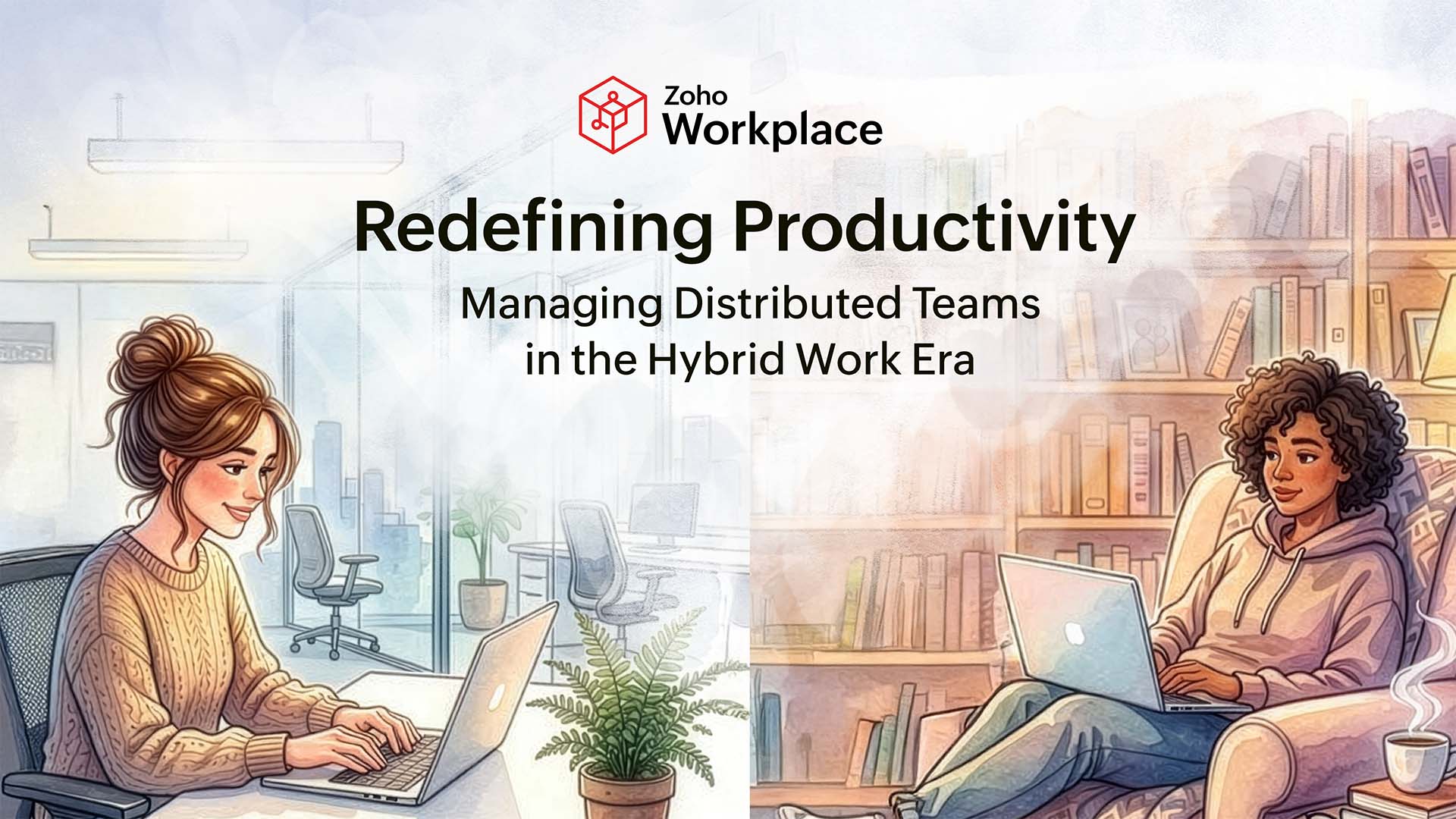- HOME
- All Products
- Collaboration
- Effective workplace communication and its importance
Effective workplace communication and its importance
- Published : December 19, 2023
- Last Updated : December 13, 2024
- 2.5K Views
- 5 Min Read
Welcome to the world of workplace communication, where every word counts and silence speaks volumes. It’s a place where the ability to communicate effectively isn’t just an optional addition to your social toolbox, it’s an absolute necessity.
Despite profits, efficiency, and even marketing taking center stage, talking and listening are still the unsung heroes in our office spaces. From the different communication styles to the methods of enhancing your own communicative prowess, we’ll unravel the secrets to successful correspondence in a professional environment.

What is workplace communication?
Workplace communication is the exchange of ideas, information and concerns among employees of an organization, either verbally or non-verbally. This includes various forms of communication like chat, email, calls, social intranet posts, notes, meetings, docs etc.
The importance of communication in the workplace
Effective communication is the cornerstone of a productive work environment. Clear and concise communication ensures that tasks are understood, processes are followed correctly, and objectives are met efficiently.
When employees and management communicate effectively, confusion is eliminated and the workflow is streamlined, leading to better results and a smoother operational process.
Enhancing team collaboration
Team collaboration thrives with communication that’s effective and candid. When team members clearly express their ideas and listen to others, it fosters a sense of understanding and cooperation.
This open exchange of information allows for better problem-solving, idea generation, and decision-making. It’s about communicating better to achieve common goals.
Effective conflict resolution
Differences of opinion are inevitable in any workplace. Effective communication plays an essential role in resolving these conflicts constructively.
It involves listening to understand different perspectives, discussing issues openly, and working together to find mutually acceptable solutions. Good communication skills and conflict-resolution strategies can turn potential disputes into opportunities for growth and learning.
Boosting workplace morale
Consistent and transparent communication contributes greatly to workplace morale. When employees feel informed about their roles, company developments, and team goals, it fosters a sense of inclusion and respect. This leads to increased employee satisfaction, loyalty, and a positive work environment where employees feel valued and motivated.
By prioritizing effective communication, a workplace can transform into a more harmonious, efficient, and productive space. Let’s dive deeper into how an employee can achieve this.
Types of communication in the workplace
Workplace communication is a blend of four key types: verbal, non-verbal, written, and digital. Verbal communication involves direct conversations, whether in person, on the phone, or via video calls, focusing on the choice of words, tone, and delivery.
Nonverbal communication encompasses body language, facial expressions, and posture, providing crucial cues that enhance or contradict spoken words.
Written communication, essential in the digital era, includes emails, reports, and memos, emphasizing clarity, conciseness, and professionalism.
Digital communication covers all electronic interactions, like emails and instant messaging, which is crucial for staying connected in various work settings. Mastering these diverse communication forms is vital for effectively conveying messages in the workplace.
Enhancing communication skills
To enhance your communication skills, focus on three key areas:
- Listening proactively
- Clarity in conveying messages
- Appropriate use of digital tools
Active listening requires full attention and understanding, asking questions, and giving feedback.
Clarity is not just about being concise and clear, but also using straightforward language, and avoiding unnecessary jargon. This can be invaluable, especially in situations where employees are in a position to ask for something, whether it’s asking for a virtual debit card to buy new subscriptions and software, or something more serious, such as company write-offs.
Selecting the right means of communication is crucial—use instant messaging for quick queries, emails for detailed feedback, and face-to-face communication for complex discussions. The more serious the matter, the lesser the need for digital correspondence.
Tips for effective workplace communication
Creating an open and efficient communication culture in the workplace doesn’t just happen overnight. It requires a concerted effort from both employees and management. Here are some practical tips to make that happen.
Embrace regular meetings
Whether it’s a weekly team check-in or a monthly all-hands meeting, regular gatherings are crucial. They keep everyone in the loop and provide a platform for discussing new ideas and addressing concerns. But remember, the key is to keep these meetings productive and focused.
Encourage feedback sessions
Constructive feedback is always a two-way street. Regular feedback sessions help in understanding what’s working and what’s not. It’s not just about giving feedback but also being open to receiving it as well. This can be through one-on-one sessions, anonymous surveys, or even a suggestion box in the break room.
Promote transparent information flow
Transparency in communication builds trust. It involves sharing the necessary information about company decisions, changes, and updates. This doesn’t mean bombarding employees with every detail–instead, provide them with enough context to understand their role in the larger picture of the company.
Utilize digital communication tools wisely
In the digital age, tools like internal chat, email, or project management software can enhance communication. Use these business technology tools to keep conversations organized and accessible, but be wary of overwhelming everyone with too many messages or notifications.
Communication and workplace efficiency
When it comes to the well-oiled machine that is your workplace, effective communication is the lubricant that keeps everything running smoothly. It’s all about making operations more streamlined and efficient.
This also entails being open to new ideas and solutions, such as the recent AI hype train. While 54% of companies report increased operational efficiency, these tools aren’t a one-size-fits-all solution.
Instead of blindly jumping onto every tool imaginable, it would be wiser to first consider the key culprits for inefficient communication and only then look for suitable solutions.
The role of open communication in representing the company
An open communication culture doesn’t just benefit internal operations; it extends to how employees represent the company externally. For instance, consider the impact that things like social media contests can have on initiatives.
When employees feel connected and informed through open communication, they’re more likely to engage with and promote company initiatives. For example, a social media contest becomes not just an excuse for intensified collaboration, but a shared project that everyone feels a part of.
Employees who are well-informed and feel a part of the company are more likely to be positive ambassadors for the brand. They can share genuine insights and experiences on social media, enhancing the company’s public image and reach.
Open communication fosters a sense of belonging and ownership among employees. When they understand the bigger picture and their role in it, they’re more likely to take initiative and contribute creatively to projects like social media contests.
External perspectives and authority insights
Let’s look beyond our walls and see what the experts are saying. Numerous authoritative sources have weighed in on the importance of effective workplace communication. Here are some key takeaways:
Enhancing team dynamics
Experts agree that good communication is vital for team building and maintenance. It helps in aligning goals and expectations, leading to a more cohesive team.
Driving employee engagement
Studies show that when communication is transparent and inclusive, employee engagement levels soar to new heights. Employees feel more connected and committed to their work.
Boosting productivity
There’s a direct correlation between effective communication and productivity. Clear instructions and feedback lead to less time wasted on clarifications and corrections.
These insights from external authorities reinforce the importance of cultivating strong communication skills in the workplace for the betterment of both individual and collective goals.
Wrapping up
As we’ve seen, whether it’s through enhancing individual skills, fostering an open communication culture, or understanding the role of communication in operational efficiency, there’s always room to grow and improve.
We encourage you to take these insights and tips and apply them to your own work environment. Remember, effective communication is not just about talking; it’s about connecting, understanding, and working together toward common goals.
 Gary Stevens
Gary StevensGary Stevens is the CTO of Hosting Canada, a website that provides expert reviews on hosting services and helps readers build online businesses and blogs. Gary specializes in topics on cloud technology, thought leadership, and collaboration at work.


